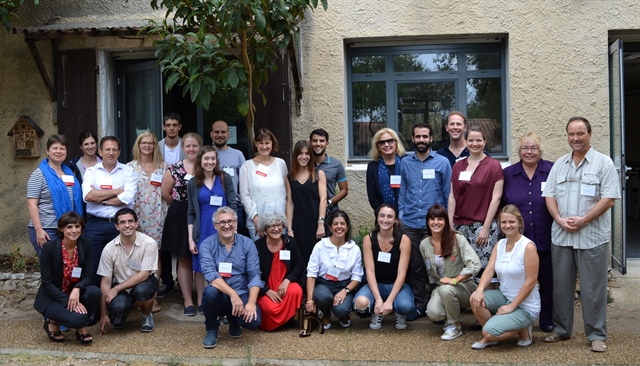Voice, Speech, and Swallowing Movement Disorders Study Group
Have questions? Contact the group's MDS Staff Liaison, Joe Grundle, at jgrundle@movementdisorders.org
Mission
This international and multidisciplinary group aims to share clinical and research experience across the world in all aspects of communication and swallowing difficulties of patients with Movement disorders.
Membership of the Speech and Swallowing in Movement Disorders Study Group includes specialists in hyperkinetic/dystonic voice disorders, swallowing, acoustic acquisition and analysis, facial expression, clinical and therapy innovations, and measuring the impact of speech impairment.

The group's First Speech and Swallowing in Parkinson's Disease School.
Projects
Speech and Swallowing Schools
Since the formation of the group in 2017, we have organized annual Speech and Swallowing schools under the auspices of the MDS.
Course history:
- 2017: Aix-en-Provence; France; Directors: Dr Serge Pinto and Dr Elina Tripoliti
- 2018: London, UK; Directors: Dr Elina Tripoliti and Dr Patricia Limousin
- 2019: Prague, Czech Republic; Directors: Dr Jan Rusz and Dr Elina Tripoliti
- 2021: Virtual School; Directors: Dr Elina Tripoliti and Dr Hanneke Kalf
- 2022: Virtual School MDT Team Work; Directors: Dr Elina Tripoliti, Dr Ota Gall and Dr Ingrid Sturkenboom
- 2023: Prague, Czech Republic, Nov 3-4, 2023. View details »
eLearning Module Development
In 2022-2023, the group members have been involved in producing online elearning education modules for speech and swallowing.
Module authors:
- Dysphagia – John Dean and Dina Shpunt
- Speech dysfunction – Elina Tripoliti
The group intends to propose a Special Issue for the MDS journal editors on “Motor and non-motor aspects of speech and language in PD.”
The proposed issue would focus on important facts, including:
- The neurological bases of normal speech production and speech impairment in PD;
- The description and assessment of speech impairment in PD;
- The relevance of a rehabilitation program targeting speech impairment in PD patients.
- Speech impairment in PD is usually only investigated from its motor aspects
- Higher-order cognitive dysfunctions contribute to dysarthria: how? Which of them? Etc.
- Speech is a component of a larger competence: communication
- Emotional and motivational aspects/deficits contribute to speech impairment in PD
- Care of patients with advanced PD.
- Case studies of rehabilitation of patients with Atypical PD and Dystonia.
Future Projects
Develop a 3-Year Plan
The group plans to to develop a 3-yrs plan in line with the MDS priorities and to encourage the following:
- Education
- Collaborating with other MDS Study Groups
- Organize educaetional material (e.g. video) to support our guidelines for speech recording and acoustic analysis
Leadership
 |
 |
 |
| Chair: Kristina Simonyan | Co-Chair: Michael Barbe | Co-Chair: Jan Rusz |
Steering Committee:
Julie Barkmeier-Kraemer
Michelle Ciucci
John Dean
Cynthia Fox
Maira Olchik
Federico Rodriguez-Porcel
Elina Tripoliti
Adam Vogel






